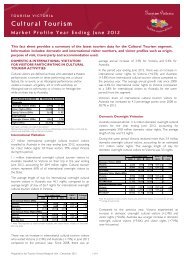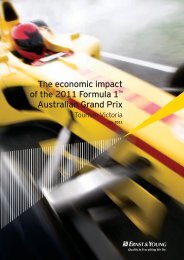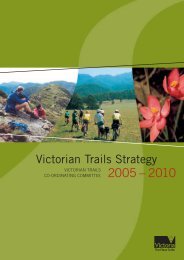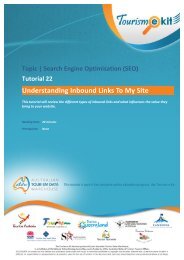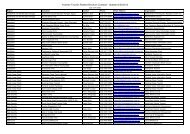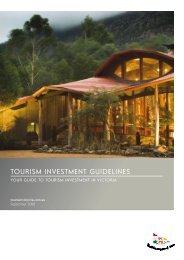Annual Report 2010–2011, Part 2: Financial (1.8 ... - Tourism Victoria
Annual Report 2010–2011, Part 2: Financial (1.8 ... - Tourism Victoria
Annual Report 2010–2011, Part 2: Financial (1.8 ... - Tourism Victoria
You also want an ePaper? Increase the reach of your titles
YUMPU automatically turns print PDFs into web optimized ePapers that Google loves.
Note 21. Glossary (continued)<br />
Forward Foreign Currency Exchange<br />
Contract<br />
Forward Foreign Currency Exchange<br />
Contract is an obligation to buy a certain<br />
amount of foreign currency at a predetermined<br />
date.<br />
Grants and other transfers<br />
Transactions in which one unit provides<br />
goods, services, assets (or extinguishes a<br />
liability) to another unit without receiving<br />
approximately equal value in return.<br />
Grants can either be operating or capital<br />
in nature.<br />
While grants to governments may result in<br />
the provision of some goods or services<br />
to the transferor, they do not give the<br />
transferor a claim to receive directly<br />
benefits of approximately equal value.<br />
For this reason, grants are referred to by<br />
the AASB as involuntary transfers and are<br />
termed non reciprocal transfers. Receipt<br />
and sacrifice of approximately equal value<br />
may occur, but only by coincidence. For<br />
example, governments are not obliged to<br />
provide commensurate benefits, in the<br />
form of goods or services, to particular<br />
taxpayers in return for their taxes.<br />
Grants can be paid as general purpose<br />
grants which refer to grants that are not<br />
subject to conditions regarding their use.<br />
Alternatively, they may be paid as specific<br />
purpose grants which are paid for a<br />
particular purpose and/or have conditions<br />
attached regarding their use.<br />
Interest expense<br />
Costs incurred in connection with interest<br />
component of finance leases repayments,<br />
and the increase in financial liabilities<br />
and non employee provisions due to<br />
the unwinding of discounts to reflect the<br />
passage of time.<br />
Interest income<br />
Interest income includes unwinding over<br />
time of discounts on financial assets and<br />
interest received on bank term deposits<br />
and other investments.<br />
Net acquisition of non financial assets<br />
(from transactions)<br />
Purchases (and other acquisitions) of non<br />
financial assets less sales (or disposals) of<br />
non financial assets less depreciation plus<br />
changes in inventories and other movements<br />
in non financial assets. It includes only those<br />
increases or decreases in non financial assets<br />
resulting from transactions and therefore<br />
excludes write-offs, impairment write-downs<br />
and revaluations.<br />
Net result<br />
Net result is a measure of financial<br />
performance of the operations for the<br />
period. It is the net result of items of<br />
income, gains and expenses (including<br />
losses) recognised for the period,<br />
excluding those that are classified as ‘other<br />
non-owner changes in equity’.<br />
Net result from transactions/net<br />
operating balance<br />
Net result from transactions or net<br />
operating balance is a key fiscal aggregate<br />
and is income from transactions<br />
minus expenses from transactions. It<br />
is a summary measure of the ongoing<br />
sustainability of operations. It excludes<br />
gains and losses resulting from changes<br />
in price levels and other changes in the<br />
volume of assets. It is the component of<br />
the change in net worth that is due to<br />
transactions and can be attributed directly<br />
to government policies.<br />
Net worth<br />
Assets less liabilities, which is an economic<br />
measure of wealth.<br />
Non financial assets<br />
Non financial assets are all assets that<br />
are not ‘financial assets’. It includes<br />
inventories, land, buildings, infrastructure,<br />
road networks, land under roads, plant<br />
and equipment, investment properties,<br />
cultural and heritage assets, intangible and<br />
biological assets.<br />
Other economic flows<br />
Other economic flows are changes in the<br />
volume or value of an asset or liability that<br />
do not result from transactions. It includes:<br />
• gains and losses from disposals,<br />
revaluations and impairments of non<br />
financial physical and intangible assets;<br />
• actuarial gains and losses arising from<br />
defined benefit superannuation plans;<br />
• fair value changes of financial<br />
instruments and agricultural assets; and<br />
• depletion of natural assets (non<br />
produced) from their use or removal.<br />
In simple terms, other economic flows<br />
are changes arising from market<br />
remeasurements.<br />
Receivables<br />
Includes amounts owing from<br />
government through appropriation<br />
receivable, short and long term trade<br />
credit and accounts receivable, accrued<br />
investment income, grants, taxes and<br />
interest receivable.<br />
Supplies and services<br />
Supplies and services generally represent<br />
cost of goods sold and the day to day<br />
running costs, including maintenance<br />
costs, incurred in the normal operations<br />
of <strong>Tourism</strong> <strong>Victoria</strong>.<br />
Transactions<br />
Transactions are those economic flows<br />
that are considered to arise as a result of<br />
policy decisions, usually an interaction<br />
between two entities by mutual<br />
agreement. They also include flows<br />
within an entity such as depreciation<br />
where the owner is simultaneously<br />
acting as the owner of the depreciating<br />
asset and as the consumer of the service<br />
provided by the asset. Taxation is<br />
regarded as mutually agreed interactions<br />
between the government and taxpayers.<br />
Transactions can be in-kind (e.g. assets<br />
provided/given free of charge or for<br />
nominal consideration) or where the<br />
final consideration is cash. In simple<br />
terms, transactions arise from the policy<br />
decisions of the government.<br />
59




